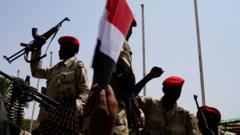Could Drone Attacks in Sudan Signal the End of the RSF Truce?

Published: 2025-11-07 14:00:28 | Category: technology
Explosions near the Sudanese capital Khartoum have raised concerns about the stability of a proposed humanitarian ceasefire by the paramilitary Rapid Support Forces (RSF). Despite the RSF's recent declaration of support for a truce, residents reported hearing drones and explosions, indicating ongoing violence amidst a civil war that has already claimed over 150,000 lives since April 2023.
Last updated: 20 October 2023 (BST)
What’s happening now
Recent reports indicate that explosions have been heard in Khartoum, particularly near military installations and a power station. Residents described being awakened by the sounds of drones and blasts in the early hours of Friday morning. This unsettling development follows the RSF's announcement of its willingness to accept a humanitarian ceasefire proposed by international actors, including the US and the UAE. However, the Sudanese government remains sceptical about the RSF's commitment to honouring ceasefires, citing past violations.
Key takeaways
- Explosions and drone sounds disrupt residents in Khartoum, raising questions about the RSF's commitment to a ceasefire.
- The RSF announced its support for a humanitarian truce, but the Sudanese government expresses caution.
- Famine conditions are worsening in conflict zones, affecting millions of Sudanese.
Timeline: how we got here
The ongoing conflict in Sudan began in April 2023, leading to widespread violence and humanitarian crises. Here is a brief timeline of key events leading up to the current situation:
- April 2023: Civil war erupts between the Sudanese army and the RSF.
- September 2023: The US, UAE, Saudi Arabia, and Egypt propose a humanitarian ceasefire.
- October 2023: RSF announces agreement to the truce; explosions reported in Khartoum.
What’s new vs what’s known
New today/this week
Residents in Khartoum and surrounding areas have reported explosions and drone activity, suggesting a continuation of hostilities despite the RSF's recent claims of agreeing to a humanitarian truce. The military government remains doubtful about the RSF's commitment, citing past ceasefire violations.
What was already established
Since the conflict began, over 150,000 people have reportedly lost their lives, and 12 million have been displaced. The UN has warned that famine conditions are spreading in conflict zones, exacerbating the humanitarian crisis.
Impact for the UK
Consumers and households
The ongoing conflict in Sudan could have indirect effects on UK consumers, particularly in sectors reliant on agricultural imports from Sudan. Heightened instability can lead to price fluctuations and supply chain disruptions in food and other commodities.
Businesses and jobs
For UK businesses operating in or with ties to Sudan, the deteriorating security situation poses risks to operations, supply chains, and employee safety. Companies may need to reassess their engagement strategies in the region.
Policy and regulation
The UK government may need to consider responses to the evolving situation, including potential humanitarian aid or sanctions against those exacerbating the conflict. Ongoing monitoring of the situation will be vital for informed policymaking.
Numbers that matter
- 150,000+ lives lost since the conflict began in April 2023.
- 12 million people displaced due to ongoing violence.
- 300 km (186 miles) distance where drone activity was reported, indicating the expanding reach of the conflict.
Definitions and jargon buster
- RSF: Rapid Support Forces, a paramilitary group involved in the Sudanese conflict.
- Ceasefire: A temporary suspension of fighting, often negotiated to allow humanitarian aid or peace talks.
How to think about the next steps
Near term (0–4 weeks)
Monitoring the situation is crucial as violence continues in Khartoum. The potential for further escalations or possible shifts in control will need close attention.
Medium term (1–6 months)
Over the coming months, the international community may push for more substantial peace negotiations, but the RSF's control over key regions complicates the landscape. Observers should look for signs of any new ceasefire agreements or humanitarian initiatives.
Signals to watch
- Reports of violence or ceasefire violations.
- International responses, including humanitarian aid offerings.
- Statements from the Sudanese government and RSF regarding negotiations.
Practical guidance
Do
- Stay informed about the conflict's developments through reliable news sources.
- Support humanitarian efforts aimed at aiding displaced populations.
Don’t
- Engage in speculation about the conflict without verified information.
- Ignore the humanitarian implications of the ongoing violence.
Checklist
- Review updates on the humanitarian situation in Sudan.
- Check for any UK government advisories regarding travel or business in the region.
- Consider ways to contribute to humanitarian aid initiatives.
Risks, caveats, and uncertainties
The situation in Sudan is fluid, with potential for rapid changes. There are uncertainties regarding the RSF's intentions and the Sudanese government's ability to negotiate in good faith. Claims of foreign interference and military support remain disputed, creating a complex backdrop for potential resolutions.
Bottom line
The recent explosions in Khartoum underscore the precarious nature of the proposed humanitarian ceasefire. As the conflict continues to escalate, the implications for both local populations and international stakeholders become increasingly severe. Ongoing vigilance and humanitarian support will be essential in the weeks ahead.
FAQs
What is the current status of the ceasefire in Sudan?
The ceasefire remains uncertain as explosions and reports of drone activity continue, contrasting with the RSF's claims of supporting a humanitarian truce.
How has the conflict in Sudan affected the civilian population?
Over 12 million people have been displaced, and famine conditions are worsening in many areas due to the ongoing violence.
What role do international actors play in the Sudanese conflict?
International actors have suggested ceasefire agreements and humanitarian aid, but their effectiveness is challenged by the conflict dynamics and local government responses.



